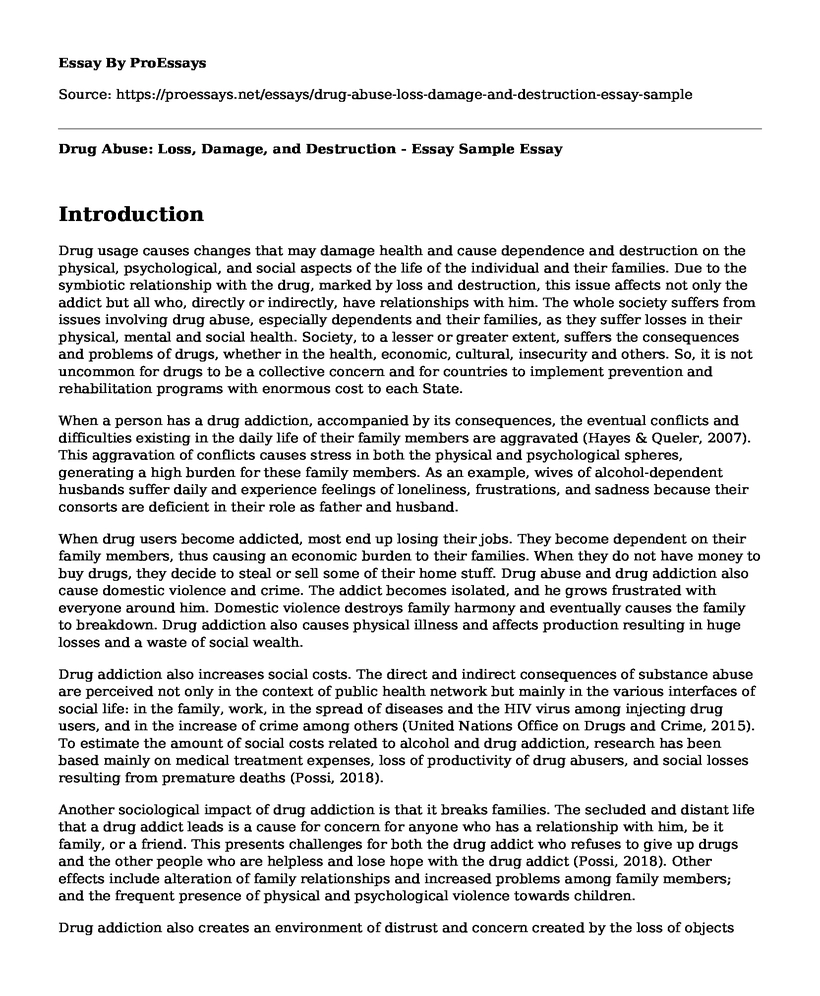Introduction
Drug usage causes changes that may damage health and cause dependence and destruction on the physical, psychological, and social aspects of the life of the individual and their families. Due to the symbiotic relationship with the drug, marked by loss and destruction, this issue affects not only the addict but all who, directly or indirectly, have relationships with him. The whole society suffers from issues involving drug abuse, especially dependents and their families, as they suffer losses in their physical, mental and social health. Society, to a lesser or greater extent, suffers the consequences and problems of drugs, whether in the health, economic, cultural, insecurity and others. So, it is not uncommon for drugs to be a collective concern and for countries to implement prevention and rehabilitation programs with enormous cost to each State.
When a person has a drug addiction, accompanied by its consequences, the eventual conflicts and difficulties existing in the daily life of their family members are aggravated (Hayes & Queler, 2007). This aggravation of conflicts causes stress in both the physical and psychological spheres, generating a high burden for these family members. As an example, wives of alcohol-dependent husbands suffer daily and experience feelings of loneliness, frustrations, and sadness because their consorts are deficient in their role as father and husband.
When drug users become addicted, most end up losing their jobs. They become dependent on their family members, thus causing an economic burden to their families. When they do not have money to buy drugs, they decide to steal or sell some of their home stuff. Drug abuse and drug addiction also cause domestic violence and crime. The addict becomes isolated, and he grows frustrated with everyone around him. Domestic violence destroys family harmony and eventually causes the family to breakdown. Drug addiction also causes physical illness and affects production resulting in huge losses and a waste of social wealth.
Drug addiction also increases social costs. The direct and indirect consequences of substance abuse are perceived not only in the context of public health network but mainly in the various interfaces of social life: in the family, work, in the spread of diseases and the HIV virus among injecting drug users, and in the increase of crime among others (United Nations Office on Drugs and Crime, 2015). To estimate the amount of social costs related to alcohol and drug addiction, research has been based mainly on medical treatment expenses, loss of productivity of drug abusers, and social losses resulting from premature deaths (Possi, 2018).
Another sociological impact of drug addiction is that it breaks families. The secluded and distant life that a drug addict leads is a cause for concern for anyone who has a relationship with him, be it family, or a friend. This presents challenges for both the drug addict who refuses to give up drugs and the other people who are helpless and lose hope with the drug addict (Possi, 2018). Other effects include alteration of family relationships and increased problems among family members; and the frequent presence of physical and psychological violence towards children.
Drug addiction also creates an environment of distrust and concern created by the loss of objects and property of the family, which are stolen to obtain the drug. It also results in the weakening of the protection capacity of the family group, causing insecurity and frustration. Drug addiction also causes an imbalance of the family economy, because money is used to consume and then not enough to cover basic expenses. All these issues not only affect addicts but also interfere in the relationship with the family environment and work.
References
Hayes, H. R., & Queler, J. M. (2007). The social consequences of drug and alcohol abuse. In Drug Courts (pp. 112-126). Springer, New York, NY. Retrieved from https://link.springer.com/chapter/10.1007/978-0-387-71433-2_7
Possi, M. K. (2018). Effects of drug abuse on cognitive and social behaviors: A potential problem among youth in Tanzania. Utafiti Journal, 3(1). Retrieved from http://archive.lib.msu.edu/DMC/African%20Journals/pdfs/Utafiti/vol3no1NS/aejp003001NS006.pdf
United Nations Office on Drugs and Crime (2015). The social impact of drug abuse. World Summit for Social Development, Copenhagen. Retrieved from https://www.unodc.org/pdf/technical_series_1995-03-01_1.pdf
Cite this page
Drug Abuse: Loss, Damage, and Destruction - Essay Sample. (2023, Mar 14). Retrieved from https://proessays.net/essays/drug-abuse-loss-damage-and-destruction-essay-sample
If you are the original author of this essay and no longer wish to have it published on the ProEssays website, please click below to request its removal:
- Research Paper on Gender Inequality in America
- Essay Sample on Gangs Formation in America
- Reduction of Homelessness - Essay Sample
- Paper Example on Gender Roles in American Society: A Preconceived Notion
- Sex Trafficking: A History of Coercion and Exploitation - Research Paper
- Cartel-Related Drug Violence & Gangs: The Realities - Essay Sample
- Free Research Paper Sample on Social Exclusion of People with Mental Illness: A Global Issue







